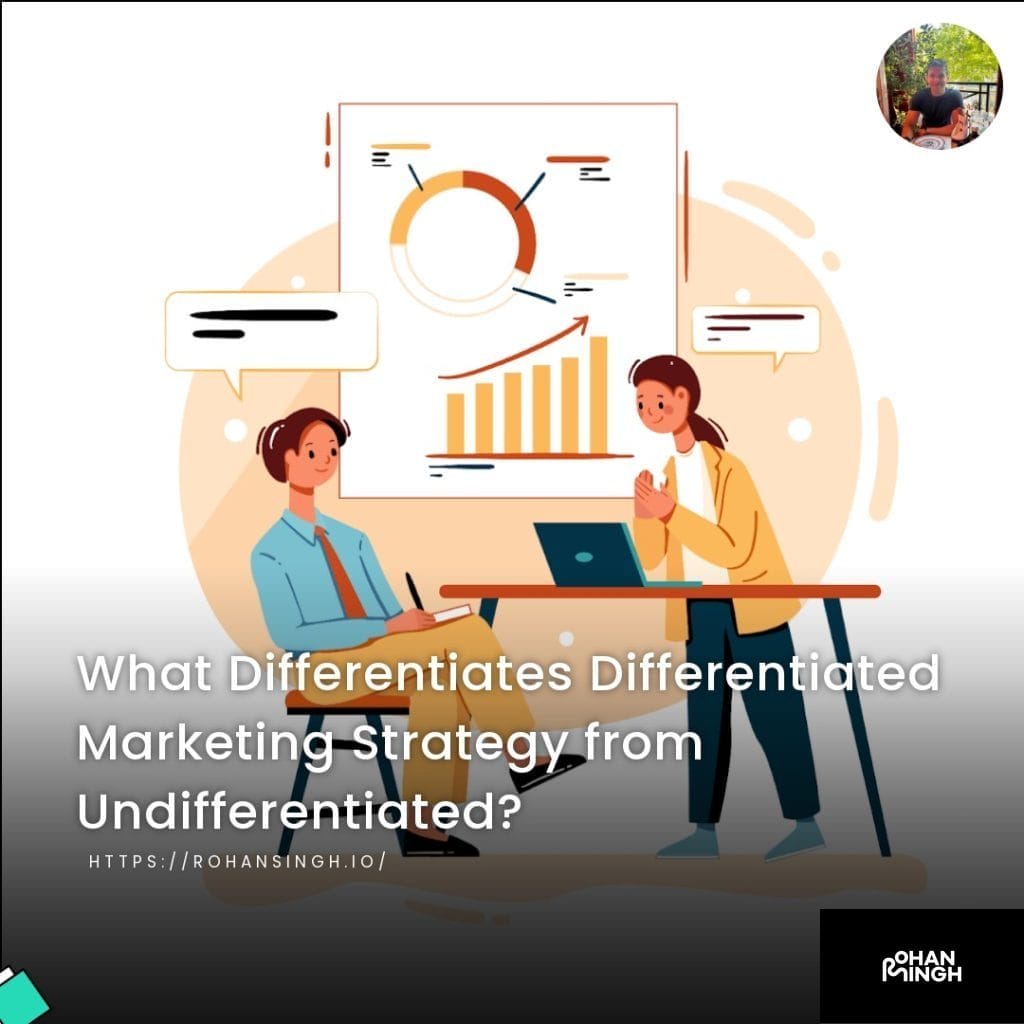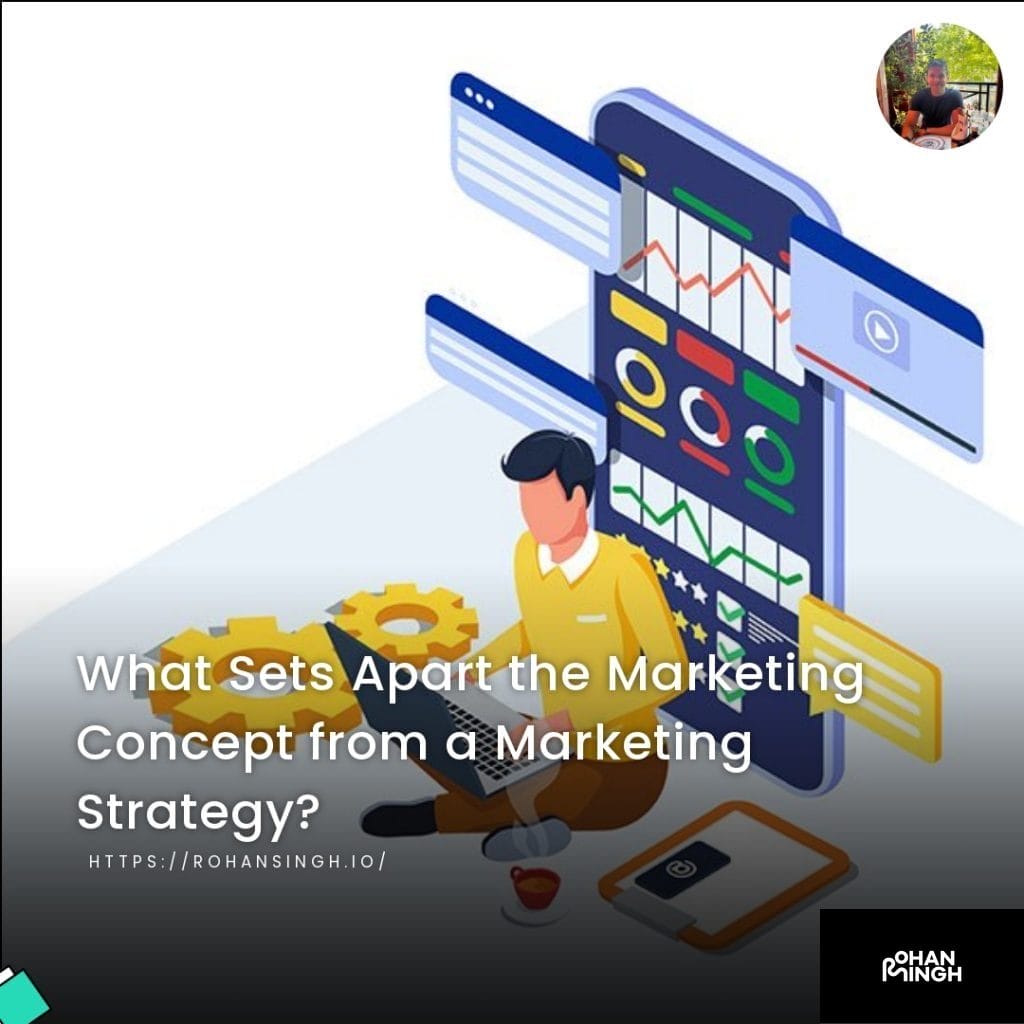What’s the difference between marketing strategy, plan, and program?

Definition of Marketing Strategy, Plan, and Program
A marketing strategy is the big-picture plan that guides all of your marketing efforts. It is a long-term approach that outlines your overall goals and objectives, and how you plan to achieve them. A well-defined marketing strategy considers your target market, competitors, positioning, and value proposition. It helps you identify and prioritize the best opportunities to reach and engage your potential customers effectively. Your marketing strategy should align with your business goals and provide a roadmap for your marketing team to follow. It should be flexible enough to adapt to changes in the marketplace but also focused enough to provide clear direction.
Table of Contents
ToggleA marketing plan is a comprehensive document that outlines the specific actions you will take to implement your marketing strategy. It is a detailed roadmap that identifies your target audience, marketing channels, tactics, and budget. Your marketing plan should include measurable goals, key performance indicators (KPIs), and a timeline for implementation. It is a tactical guide that outlines the specific steps and resources required to achieve your marketing objectives. A well-developed marketing plan provides a clear blueprint for your marketing team, ensuring that everyone is working towards the same goals and objectives.
A marketing program is a set of interconnected marketing activities and campaigns designed to achieve specific marketing objectives. It is the execution of your marketing plan, putting your strategy into action. A marketing program includes various components such as advertising campaigns, social media marketing, email marketing, content marketing, and other promotional activities. It involves coordinating different marketing channels, using the right mix of tactics to reach your target audience and generate awareness, leads, and sales. Your marketing program should be adaptable and responsive to changes in the market and consumer behavior. It requires ongoing monitoring, analysis, and optimization to ensure its effectiveness and maximize return on investment (ROI).
Benefits of Having All Three
Having a well-defined marketing strategy, plan, and program is crucial for the success of any company. While each serves a different purpose, they work together to create an effective marketing approach that helps businesses achieve their goals.
A marketing strategy sets the foundation for all marketing efforts. It outlines the overall goals and objectives of the company, identifying target audiences and competitors, and determining the best ways to position the brand in the market. By having a clear marketing strategy, businesses can focus their resources and efforts on activities that align with their marketing goals, resulting in more targeted and impactful marketing campaigns.
A marketing plan takes the marketing strategy a step further by providing a detailed roadmap of the specific actions to be taken. It includes identifying the target audience, selecting the most effective marketing channels and tactics, and setting a budget and timeline. With a well-developed marketing plan, businesses can ensure that their marketing activities are aligned with their marketing strategy, allowing for consistent and cohesive messaging across all channels.
Lastly, a marketing program is the execution of the marketing plan. It involves implementing the specific marketing activities and campaigns outlined in the plan, tracking and analyzing the results, and making necessary adjustments. A marketing program ensures that the marketing efforts are consistent and targeted, helping businesses reach their target audience effectively and efficiently.
When all three – marketing strategy, plan, and program – are in place, businesses can benefit in many ways. It allows for a more focused and cohesive approach to marketing, ensuring that resources are allocated to the right activities and that messaging is consistent across channels. It also helps businesses track the effectiveness of their marketing efforts and make data-driven decisions to optimize their campaigns. By having all three in place, businesses can create a strategic and comprehensive marketing approach that drives results and contributes to the achievement of their overall business goals.
Let's talk about your future project!
Eager to collaborate on your upcoming endeavor? Let's explore and ignite the potential of your next big idea, shaping a promising future together!
Differences Between Marketing Strategy, Plan, and Program
When it comes to marketing, it’s important to understand the key differences between strategy, plan, and program. While these terms are often used interchangeably, they each have their distinct purpose and role in driving a company’s marketing efforts.
A marketing strategy is like the North Star that guides a company’s marketing initiatives. It is the overarching plan that outlines the goals and objectives of the business, identifies the target market and competitors, and determines the best approach to position the brand. Think of it as the big-picture vision that sets the direction for all marketing activities. A well-defined marketing strategy helps businesses make informed decisions about where to focus resources and efforts, ensuring that they are effectively reaching their potential customers.
On the other hand, a marketing plan takes the marketing strategy and breaks it down into actionable steps. It provides a detailed roadmap that specifies the specific marketing tactics and channels to be used, along with a set budget and timeline. By outlining the specific actions to be taken, a marketing plan helps businesses stay organized and focused on their marketing goals. It allows for better coordination and alignment across marketing teams, ensuring that all activities are working towards the same objectives.
Once the marketing strategy and plan are in place, it’s time to execute the marketing program. This is where all the planned marketing activities and campaigns are put into action. It involves implementing the tactics outlined in the marketing plan, tracking and analyzing the results, and making any necessary adjustments along the way. A marketing program ensures that the marketing efforts are consistent, targeted, and effective, helping businesses reach their target audience and achieve their marketing goals.
In conclusion, while marketing strategy, plan, and program are closely related, they each play a unique role in driving a company’s marketing success. The strategy provides the overall direction, the plan outlines the specific actions to be taken, and the program is the execution of those actions. By understanding these differences, businesses can develop a well-rounded marketing approach that maximizes their impact and drives growth.

Difference Between a Marketing Strategy and a Plan
When it comes to creating an effective marketing campaign, it is vital to understand the distinction between a marketing strategy and a marketing plan. A marketing strategy outlines the overall goals and objectives of the marketing campaign, answering the “why” behind the chosen tactics. It is like the foundation of a house, providing the blueprint for the entire marketing effort. A well-crafted marketing strategy takes into consideration the target audience, competition, and market trends to determine the most effective approach to reach potential customers. It sets the direction and guides decision-making throughout the campaign.
In contrast, a marketing plan details the specific actions needed to achieve those goals and objectives, answering the “how.” It takes the strategy and breaks it down into actionable steps, laying out the tactics, channels, budget, and timeline. A marketing plan is a more detailed and action-oriented plan that outlines how a marketing strategy will be executed. It allows for better organization and coordination, ensuring that all activities align with the overall goals. By outlining the specific steps to be taken, a marketing plan provides clarity and direction for the marketing team, helping them execute the strategy effectively.
In summary, a marketing strategy is a big-picture plan that defines the goals and objectives of a marketing campaign, while a marketing plan is a more detailed and action-oriented plan that outlines the specific steps to be taken to achieve those goals and objectives. Both are essential components of a successful marketing campaign, working hand in hand to guide and execute the marketing efforts.
Difference Between a Marketing Plan and a Program
A marketing plan and a marketing program may sound similar, but they have distinct differences in terms of scope and components.
A marketing plan is a detailed and action-oriented document that outlines the specific tactics and actions needed to achieve the goals and objectives set out in the marketing strategy. It provides a roadmap for the marketing team, guiding them on how to execute the overall strategy effectively. The plan typically includes components such as budget allocation, target audience, schedule, and a detailed description of the tactics to be implemented. It is a practical and organized approach that ensures all activities align with the overall marketing strategy.
On the other hand, a marketing program is a broader suite of marketing initiatives that contribute to the objectives laid out in the marketing strategy. It encompasses multiple channels and may involve various tactics such as advertising campaigns, content marketing efforts, direct mail, events, and more. It takes into consideration the overall marketing objectives and incorporates different initiatives to reach those goals. A marketing program focuses on the bigger picture and serves as a comprehensive approach to driving results.
While a marketing plan outlines the specific actions to be taken, a marketing program is the collection of all these initiatives that work together to achieve the desired outcomes. By understanding the difference between the two, businesses can create a strategic marketing approach that combines both detailed tactics and broader programs to effectively reach their target audience and achieve their marketing objectives.
Difference Between a Marketing Program and a Strategy
A marketing program and a marketing strategy are both essential components of a successful marketing approach, but they serve distinct purposes in achieving business goals.
A marketing strategy is a long-term plan that outlines the overall direction and objectives of a company’s marketing efforts. It involves identifying and understanding the target audience, their needs and preferences, and the competitive landscape. By conducting market research and analysis, a marketing strategy aims to position the company effectively, differentiate it from competitors, and determine the best tactics to reach the target market. It provides a roadmap for the company’s marketing activities and helps guide decision-making.
On the other hand, a marketing program is more focused on the execution of the strategy. It is a coordinated set of activities and tactics that are designed to achieve specific objectives within a set timeframe. A marketing program includes the actual implementation of the marketing strategy, such as advertising campaigns, content marketing initiatives, social media marketing, and other promotional activities. It involves the deployment of marketing tactics and tools to reach the target audience, generate leads, and drive conversions.
In summary, while a marketing strategy sets the overall direction and objectives, a marketing program is the practical implementation of those strategies through various tactics and activities. Together, they work hand in hand to ensure the company effectively reaches its target market and achieves its marketing objectives.

Components of Each Marketing Strategy, Plan and Program
Developing a successful marketing strategy requires a deep understanding of your target markets, marketing goals, and the overall business objectives. It involves crafting a comprehensive plan that outlines the steps needed to achieve those goals. A marketing strategy defines the key activities and initiatives that will help you reach your target audience and increase your market share. It provides a clear roadmap for your marketing efforts and ensures that all marketing activities are aligned with your business objectives.
A marketing plan, on the other hand, is a detailed document that lays out the specific tactics and activities that will be executed to implement the marketing strategy. It includes the specific actions, timelines, and budget allocations for various marketing initiatives. A marketing plan serves as a guide for your marketing team, ensuring that everyone is on the same page and working towards the same goals. It also helps you measure the effectiveness of your marketing efforts by providing key performance indicators to track and analyze.
Lastly, a marketing program focuses on the execution of the marketing plan. It encompasses the actual implementation of the marketing tactics and initiatives outlined in the plan, such as advertising campaigns, social media marketing, content marketing, and other promotional activities. A marketing program is typically time-bound and includes measurable goals and objectives to ensure that progress can be tracked and evaluated. By executing a well-defined marketing program, you can effectively engage with your target audience, generate leads, and drive conversions for your business.
Remember, a successful marketing strategy, supported by a well-developed marketing plan and executed through a strategic marketing program, can provide a solid foundation for achieving your business objectives and staying ahead of the competition in today’s dynamic market.
Components of a Marketing Strategy
A well-crafted marketing strategy should encompass several key components to ensure its effectiveness in achieving your business goals. First and foremost, it is crucial to identify your goals. These can include increasing brand awareness, boosting sales, or expanding your customer base. Defining your goals will provide a clear direction for your marketing efforts and allow you to measure your success along the way.
Equally important is understanding your target market. Conducting thorough market research to identify your ideal customer will enable you to tailor your marketing messages and tactics to resonate with them. It is also essential to analyze your competitors to understand their strategies and identify any gaps in the market that your company can capitalize on.
To differentiate yourself from the competition, it is vital to establish your unique value proposition. This is the specific aspect of your product or service that sets it apart from others in the market. By clearly communicating this to your target audience, you can position yourself as the preferred choice and build a loyal customer base.
Identifying the most effective channels to reach your target audience is another crucial element of a marketing strategy. This could include social media platforms, search engines, email marketing, or traditional advertising methods. It is important to carefully choose the channels that align with your target market’s preferences and behavior.
Additionally, setting a realistic budget for your marketing efforts is essential. Allocating resources strategically will ensure that you can implement your marketing initiatives effectively. Lastly, creating a plan for measuring success is crucial to evaluate your marketing strategy’s impact. This could involve tracking key performance indicators such as website traffic, conversion rates, or customer engagement metrics.
By considering these key components in your marketing strategy, you can develop a comprehensive and effective plan to achieve your business goals and stand out from the competition.
Final Thoughts
In conclusion, understanding the difference between marketing strategy, marketing plan, and marketing program is crucial for any business looking to drive growth and achieve its goals.
A marketing strategy is the overall approach and direction that guides your marketing efforts. It involves analyzing your target market, identifying your unique value proposition, and determining the most effective channels to reach your audience. It sets the foundation for your marketing plan and helps ensure that your tactics are aligned with your business objectives.
A marketing plan is a detailed roadmap that outlines the specific actions, timelines, and resources required to execute your marketing strategy. It includes measurable goals, budget allocation, and a comprehensive analysis of your marketing activities. By developing a well-crafted marketing plan, you can effectively coordinate your marketing efforts and maximize your return on investment.
On the other hand, a marketing program refers to the actual implementation and execution of your marketing tactics. It involves executing campaigns, creating content, managing advertising channels, and continuously monitoring and adjusting your strategies. A strong marketing program requires a dedicated marketing team, the use of marketing tools and technologies, and a constant focus on monitoring and optimizing performance.
Ultimately, a successful marketing strategy, supported by a well-designed marketing plan and executed through an effective marketing program, will allow your business to reach and engage your target audience, differentiate yourself from your competition, and drive measurable results. With careful planning and a customer-centric approach, your marketing efforts will have the power to fuel the growth and success of your business.
FAQs
What is the difference between a marketing plan and a strategy?
A marketing strategy is the overall approach and direction that guides your marketing efforts. It involves analyzing your target market, identifying your unique value proposition, and determining the most effective channels to reach your audience. On the other hand, a marketing plan is a detailed roadmap that outlines the specific actions, timelines, and resources required to execute your marketing strategy. It includes measurable goals, budget allocation, and a comprehensive analysis of your marketing activities.
Can you provide examples of marketing programs?
Certainly! Examples of marketing programs include executing campaigns, creating content, managing advertising channels, and continuously monitoring and adjusting strategies. It involves the implementation and execution of your marketing tactics, such as email marketing, social media marketing, online advertising, and more. To run a successful marketing program, businesses often rely on marketing tools and technologies, a dedicated marketing team, and a constant focus on monitoring and optimizing performance.
How do marketing programs contribute to marketing goals?
Marketing programs play a crucial role in achieving marketing goals. They help businesses implement and execute the tactics laid out in the marketing plan. By continuously monitoring and adjusting strategies, marketing programs ensure that efforts are aligned with the overall marketing strategy. They allow businesses to engage with customers, promote their products or services, and build brand awareness, which in turn can contribute to increased sales, customer loyalty, and overall business growth.
Do I need all three: marketing strategy, marketing plan, and marketing program?
Yes, all three components are essential for a successful marketing approach. A marketing strategy provides the foundation and direction, guiding your marketing efforts. A marketing plan translates this strategy into actionable steps, timelines, and resources. Finally, a marketing program is the execution and implementation of those tactics, ensuring that your marketing activities are aligned with your strategy and plan.
How can I measure the effectiveness of my marketing program?
Measuring the effectiveness of your marketing program is crucial to understanding its impact and making informed decisions. Key performance indicators (KPIs) can help you track success, such as website traffic, conversion rates, customer acquisition cost, and social media engagement. By analyzing these metrics regularly, you can improve your marketing efforts, optimize your strategies, and ensure a better return on investment.
In conclusion, understanding the differences between marketing strategy, marketing plan, and marketing program is essential for driving growth and achieving business goals. Through successful execution and optimization of marketing programs, businesses can effectively reach their target audience, engage with customers, and achieve measurable results.
Marketing Plan vs. Marketing Strategy: What's the Difference?
Having a clear understanding of the differences between a marketing plan and a marketing strategy is crucial for the success of any organization’s marketing efforts. While both are essential components of a comprehensive marketing approach, they serve different purposes and have distinct characteristics.
A marketing strategy sets the stage for all marketing activities and provides the overarching approach used to achieve specific marketing goals. It involves analyzing the target market, assessing competition, identifying unique value propositions, and determining the most effective channels to reach the target audience. For example, a marketing strategy for a cosmetics company could be to position itself as a high-end brand targeting affluent individuals through luxury retail stores and high-end fashion magazines.
On the other hand, a marketing plan is a document that outlines the specific actions, timelines, and resources required to implement the marketing strategy. It includes detailed steps for executing marketing tactics, budget allocation, measurable goals, and a comprehensive analysis of marketing activities. For instance, a marketing plan for the cosmetics company mentioned earlier could include launching a new collection, running social media campaigns, conducting influencer partnerships, and organizing beauty events.
While a marketing strategy provides the direction and foundation, a marketing plan ensures that the strategy is translated into actionable steps and measurable goals. The two are interconnected, as the marketing plan is based on the marketing strategy and serves as a roadmap for executing the strategy effectively. Without a well-defined marketing strategy, organizations would struggle to create an effective marketing plan, and vice versa.
Therefore, organizations must develop both a marketing strategy and a marketing plan to maximize marketing effectiveness. The strategy provides the vision and direction, while the plan outlines the specific steps and resources needed to achieve that vision. By having a well-defined marketing strategy and a detailed marketing plan, organizations can align their marketing efforts with their overall business objectives, attract potential customers, and gain a competitive edge in the market.
What is a marketing plan?
A marketing plan is a critical tool that outlines the specific tactics, campaigns, initiatives, and promotions a business will use to achieve its marketing goals. It serves as a strategic roadmap, guiding the organization on how to effectively reach and engage its target audience. Without a well-defined marketing plan, businesses would struggle to have a clear direction and focus in their marketing efforts.
Having a marketing plan is essential for several reasons. First and foremost, it helps businesses identify their target audience and understand their needs and preferences. This allows them to tailor their marketing strategies and messages specifically to resonate with their ideal customers. Additionally, a marketing plan ensures that resources, such as budget and manpower, are allocated effectively to maximize the impact of marketing efforts. It helps prioritize initiatives and establish a timeline for executing campaigns, ensuring that every marketing activity is aligned with the overall goals and objectives of the business.
With a marketing plan in place, businesses have a measurable way of tracking success and identifying areas for improvement. By setting clear metrics and goals, such as increasing sales, improving brand awareness, or driving website traffic, organizations can evaluate the effectiveness of their marketing activities and make data-driven decisions moving forward.
Furthermore, a marketing plan should be flexible and adaptable. As the business landscape and consumer preferences change, businesses must be able to shift priorities and adjust their marketing strategies accordingly. By regularly reviewing and updating the marketing plan, businesses can stay agile and responsive to market trends and emerging opportunities.
In conclusion, a marketing plan is a strategic roadmap that is crucial for the success of any business. It provides a clear direction, ensures effective allocation of resources, and allows for measuring and evaluating the impact of marketing efforts. By having a well-defined marketing plan, businesses can stay focused, make informed decisions, and ultimately achieve their desired marketing goals.
What is a marketing strategy?
A marketing strategy is a roadmap that guides businesses toward their ultimate goals. It is a comprehensive plan that outlines the actions and tactics to be taken to achieve the desired business outcomes. A well-defined marketing strategy not only helps businesses connect with their target audience, but also sets them apart from their competitors in a crowded marketplace.
At its core, a marketing strategy is built upon a deep understanding of the business goals and objectives. It takes into account factors such as target audience, competitor analysis, messaging, unique value proposition, and channels for reaching potential customers. By aligning these elements, businesses can create a focused and cohesive plan that ensures their marketing efforts are strategically targeted and impactful.
Having a clear marketing strategy serves as a strong foundation for all marketing activities. It helps businesses identify the most effective ways to reach their target audience, communicate their value proposition, and differentiate themselves from competitors. With a well-crafted marketing strategy in place, businesses can make informed decisions, allocate resources effectively, and ultimately achieve their desired results. So, whether you’re a small start-up or an established company, investing time and effort into developing and implementing a solid marketing strategy is essential for long-term success.
How to Create a Marketing Strategy?
Creating a marketing strategy is a crucial step in effectively promoting a business and achieving its goals. To develop a comprehensive marketing strategy, practical steps need to be taken. Firstly, it is important to identify the goals and objectives that the business wants to achieve through its marketing efforts. This ensures that all marketing activities are aligned with the overall business strategy.
Next, it is necessary to clearly understand the target market and identify the specific segments or demographics that the business aims to reach. This helps in tailoring the marketing messages and choosing the most effective channels to reach the intended audience. Additionally, conducting a thorough analysis of competitors is essential to identify their strengths, weaknesses, and market positioning. This information can be used to differentiate the business and position it uniquely in the market.
Assessing opportunities and threats is another crucial step in creating a marketing strategy. This can be done through market research to identify trends, customer behaviors, and emerging markets. Analyzing competitors’ strategies and market share can also help identify potential threats. By understanding the opportunities and threats, businesses can make informed decisions about the marketing activities that will yield the best results.
Lastly, it is important to regularly review and update the marketing strategy. The market and consumer behaviors are constantly evolving, and keeping the strategy up to date ensures that the business remains relevant and competitive. By continuously fine-tuning the marketing strategy, businesses can stay on track to achieve their goals and capture new opportunities in the market.
How to Create a Marketing Plan?
Creating a marketing plan is essential for a business to effectively reach its target audience and achieve its marketing goals. To start, it is important to define the value proposition of the business and how it uniquely solves the customer’s problem. This includes highlighting the benefits of the product or service and emphasizing why the customer should choose this business over its competitors. By clearly communicating the value proposition, the marketing plan can effectively position the business in the market.
The next step in creating a marketing plan is defining the target market. This involves determining the demographic and psychographic profiles of the ideal customer, understanding their needs and preferences, and identifying the best ways to reach them. By gaining insights into the target market, the marketing plan can be tailored to specifically address their needs and interests.
Once the target market is defined, the marketing mix and channels can be determined. This includes deciding on the right combination of product, price, promotion, and distribution channels to effectively reach the target audience. It is essential to choose the marketing channels that will provide the best reach and engagement with the target market.
To measure the success of the marketing plan and track progress, key performance indicators (KPIs) should be developed. These can include metrics such as sales revenue, customer acquisition cost, website traffic, and social media engagement. By regularly monitoring these KPIs, adjustments can be made to the marketing plan to ensure it is meeting business objectives and driving results.
Additionally, the marketing plan should outline how marketing materials will be created and distributed, how campaigns will be tracked, and how results will be measured. This includes developing a content calendar, utilizing marketing tools and software, and analyzing data to gain actionable insights.
By following these steps and considering the key components of a marketing plan, businesses can create a comprehensive and effective roadmap for reaching their target audience and achieving marketing success.
How a Marketing Strategy and Plan Work Together?
A marketing strategy and a marketing plan are not two isolated entities but rather work hand in hand to drive business growth and success. Think of it as a dance where the strategy takes the lead, guiding the plan to execute its moves flawlessly. The strategy sets the tone and direction, providing valuable insights and understanding of the target market, competitors, and overall business objectives. It is the guiding force that helps in making informed decisions and determining the best course of action.
On the other hand, the marketing plan takes cues from the strategy and translates it into actionable steps and initiatives. It outlines the specific goals, tactics, and timelines needed to achieve the strategic vision. Without a well-defined strategy, the planning phase becomes aimless, like a ship without a compass. It is the strategy that brings purpose and clarity to the planning process, ensuring that every marketing activity is aligned with the overall business objectives.
For smaller companies that may only run one or two major campaigns in a year, the strategy and plan may be incorporated into one document. This allows for a more streamlined approach where the strategy provides the foundation and the plan serves as the detailed roadmap. This consolidated document becomes a valuable tool for smaller organizations, providing them with a comprehensive overview of their marketing efforts and enabling them to make informed decisions and track progress effectively. After all, it’s the synergy between the strategy and plan that helps businesses navigate the ever-changing marketing landscape and achieve their goals.
What a Marketing Strategy Looks Like?
A marketing strategy is the backbone of any successful marketing effort. It provides a clear roadmap for achieving business goals by outlining the steps and tactics necessary to reach your target market and gain a competitive advantage. A well-crafted marketing strategy encompasses various key components, starting with a deep understanding of your target market. By identifying their needs, preferences, and pain points, you can tailor your marketing efforts to resonate with them.
Additionally, a comprehensive marketing strategy involves studying your competitors. Analyzing their offerings, marketing tactics, and positioning in the market allows you to differentiate yourself and create a unique value proposition. This analysis helps you craft an external marketing message that effectively communicates the benefits and advantages of your products or services.
Another critical aspect of a marketing strategy is setting internal positioning goals. These goals determine the brand image and perception you want to establish in the minds of your target audience. They guide your marketing efforts and ensure consistency in messaging across different channels and touchpoints.
To develop a complete and effective marketing strategy, it is essential to conduct a situation analysis. This analysis involves assessing your strengths, weaknesses, opportunities, and threats in the market. By gaining a strong understanding of your position in the market, you can better identify areas for improvement and devise strategies that capitalize on your strengths.
In summary, a marketing strategy is a comprehensive plan that enables businesses to effectively reach their target market, differentiate themselves from competitors, and achieve their business objectives. It lays the foundation for successful marketing campaigns and ensures that all efforts are aligned with the overall goals of the business.
What Marketing Strategy Did Cheetos Employ for Plants vs. Zombies Collaboration?
Rohan Singh | May 1, 2024 | Acquisition What Marketing Strategy Did Cheetos Employ for Plants vs. Zombies Collaboration? Background on Cheetos Cheetos, a popular brand of cheese-flavored snacks, has made a name for itself with its bold and playful marketing strategies. Known for its irreverent and creative campaigns, Cheetos has consistently found unique ways […]
What Marketing Strategy Did Cheetos Employ for Plants vs. Zombies Collaboration?
Rohan Singh | May 1, 2024 | Acquisition What Marketing Strategy Did Cheetos Employ for Plants vs. Zombies Collaboration? Background on Cheetos Cheetos, a popular brand of cheese-flavored snacks, has made a name for itself with its bold and playful marketing strategies. Known for its irreverent and creative campaigns, Cheetos has consistently found unique ways […]
What Differentiates Differentiated Marketing Strategy from Undifferentiated?
Rohan Singh | April 30, 2024 | Acquisition What Differentiates Differentiated Marketing Strategy from Undifferentiated? Definition of Differentiated Marketing Strategy A differentiated marketing strategy is a targeted approach that focuses on creating unique products or services to meet the specific needs and preferences of different customer segments. It recognizes that customers have diverse tastes, preferences, […]
What Sets Apart the Marketing Concept from a Marketing Strategy?
Rohan Singh | April 29, 2024 | Acquisition What Sets Apart the Marketing Concept from a Marketing Strategy? Definition of Marketing Concept The marketing concept is a philosophy that places the customer at the center of all marketing activities. It focuses on understanding the needs and wants of the target market and delivering value to […]
Which promotional mix strategy targets market channel members?
Rohan Singh | April 28, 2024 | Acquisition Which promotional mix strategy targets market channel members? When it comes to promoting a product or service, companies utilize various strategies to reach their target audiences. One key strategy that directs marketing efforts toward market channel members is known as trade promotion. Trade promotion is a type […]
Should charter schools adopt regional or national marketing strategies?
Rohan Singh | April 27, 2024 | Acquisition Should charter schools adopt regional or national marketing strategies? Purpose When it comes to marketing strategy in the field of charter schools, two broad approaches can be taken: regional and national. Each approach has its purpose and benefits depending on the goals and aspirations of the charter […]
How Can You Optimize ChatGPT 3.5 Turbo for Maximum Efficiency?, Ready to Safeguard Your Content and Traffic from ChatGPT?, What Is Costco’s Growth Strategy for Success?, What sets apart a business model from a marketing strategy?, How do marketing strategy and objectives align for business success?, How do marketing strategy and goals align for business success?
How do marketing objectives differ from marketing strategies?, What’s the difference between a go-to-market strategy and marketing mix?, How does a marketing strategy differ from a marketing channel?, What sets marketing strategy apart from operational strategy?, What’s the difference between corporate and marketing strategy?, How does a marketing strategy differ from a creative strategy?, How does corporate strategy align with marketing efforts?
What sets apart an email marketing strategy from an email newsletter?, How does content marketing strategy differ from product marketing?, What differentiates a marketing strategy from an advertising strategy?, What is the difference between brand marketing and brand strategy?, How does the marketing strategy for consulting services differ from operations?, How Does Marketing Strategy Differ from Repositioning? Learn More!, What Can We Learn from the Starbucks Global Marketing Strategy Case Study?, How Do Corporate Strategy and Marketing Differ in Business?
What are the differences between Coca-Cola’s marketing strategy and tactics?, How do marketing strategies differ from marketing techniques?, How do corporate strategy and marketing strategy differ?, What distinguishes a marketing plan from a sales strategy?, Are Forward-Thinking Emails the Future of Email Marketing Strategy?
What is the difference between brand building strategy and product marketing strategy?, Which is better: Iterative marketing strategy or strict methodology?, What sets apart the marketing mix from marketing strategy?, How do business strategy and marketing strategies differ?, How does product strategy differ from marketing strategy?, What is the purpose and focus of a marketing strategy?, How does marketing strategy differ from commercial strategy?, What differentiates a marketing strategy from a marketing plan?, What’s the difference between marketing strategy, plan, and program?
Share :






